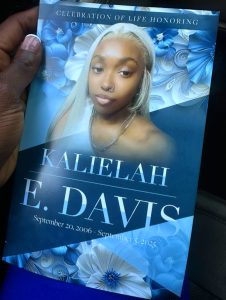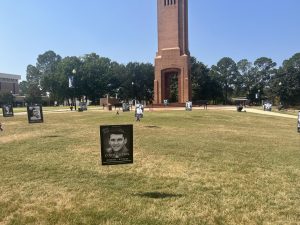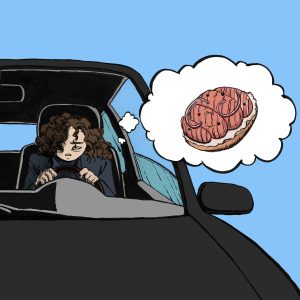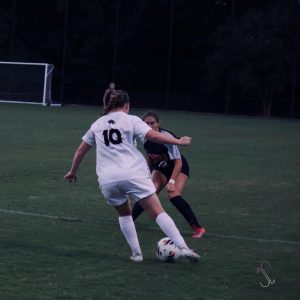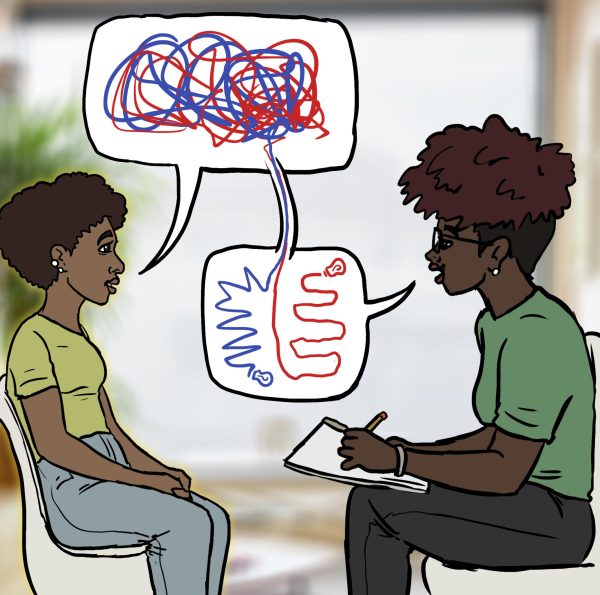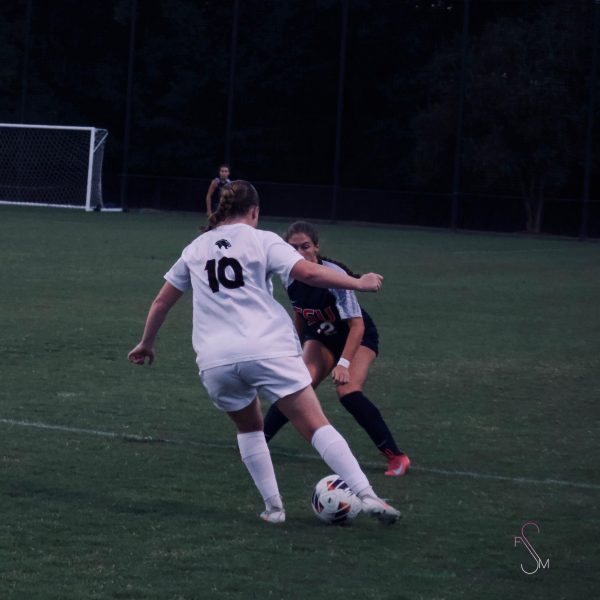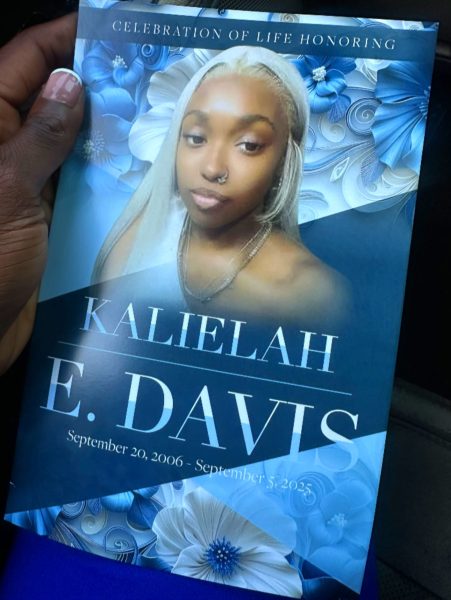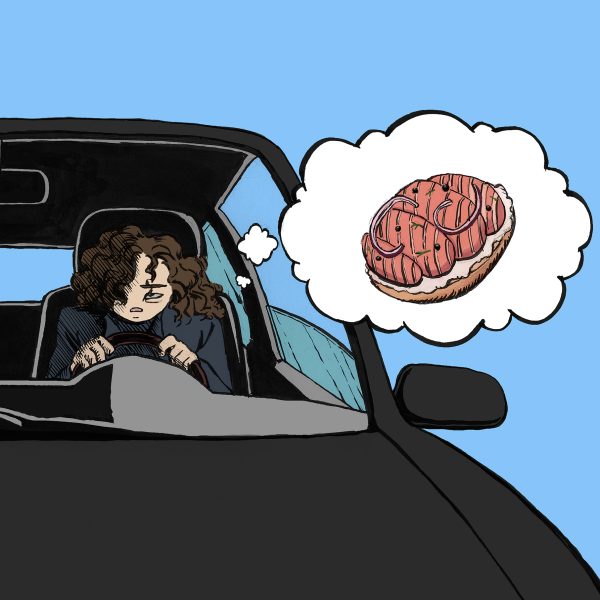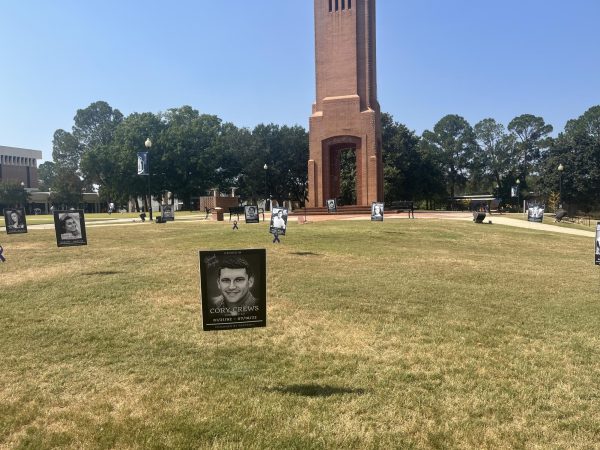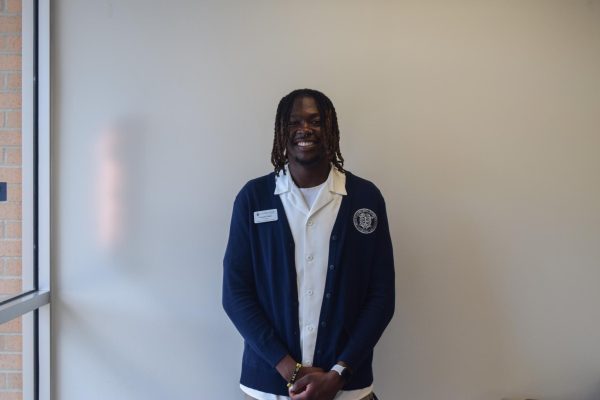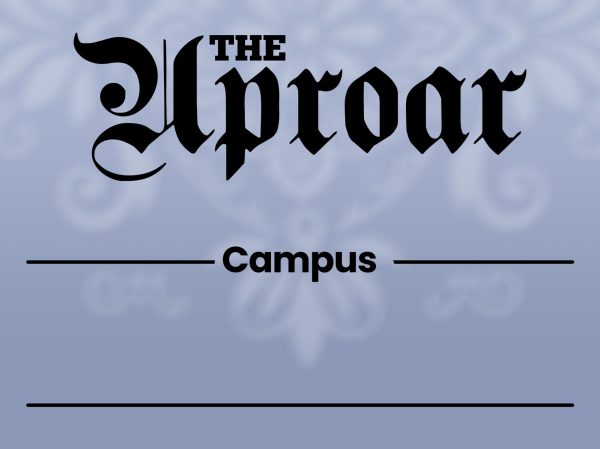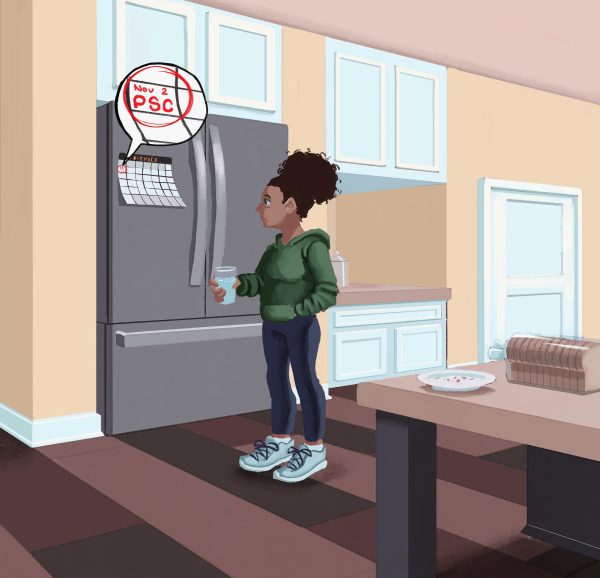Hiring Information
Online Application Form
Work at The Uproar
The Uproar is a professional media organization run and supported by the students of Columbus State University. Choosing to work for this organization is a commitment to the ideals of ethical journalism and a desire to put forth your absolute best work in service to our readers. The Uproar produces content in the form of a monthly print magazine and in the form of online media.
To apply to The Uproar, fill out this form. Once you have done so, we will deliberate your application. If we decide to go forward with the process, we will contact you to set up a short interview. Any questions about employment or the application process can be directed to our email, uproarcsu@gmail.com.
No experience is required, and we consider applicants regardless of major. However, we have a minimum GPA requirement of 2.50 and will not review applicants who do not meet this requirement.
Applications are currently open for: Editor-in-Chief, Senior Media Editor, Social Media Manager, Layout Editor, Managing Editor, Reporter, Copy Editor
Positions at The Uproar
Reporters
Reporters are expected to look, listen, and develop their own story ideas. All reporters should be informed of campus, local, national and international news. Additional locations to look are on the CSU main website, which offers many ways to find information.
Specific Duties:
- Be active in meetings by pitching ideas and volunteering for stories.
- Produce articles from personal ideas, outside tips, or as requested by the editorial staff.
- Be PROACTIVE in working with your assigned illustrator, photographer, and copy editor. The media must match the story, and that requires two-way communication. Brainstorm a clear way to represent how you want your article illustrated.
- Finish articles as early as possible to allow for critique and feedback.
- Extensions must be petitioned for. Pay may be withheld for late submissions without a valid reason. You will be dismissed if it becomes a habit.
- Generally, use pyramid format for hard news articles, which means the most important details (Who, What, When, Where) are given first, and less important details come later.
- Conduct thorough research for articles. Use government sources, magazines, newspapers, and books to find information.
- SEEK QUOTES. Quotations allow you to tell the story in the words of those who experience it firsthand. Get quotations from students, faculty, and staff, and use these to inform and expand upon points made in your article. Failure to receive quotes without reason may mean a reduction in pay.
- Any student quoted needs to have their FULL NAME, ACADEMIC YEAR and MAJOR included in the identifier.
- Develop connections across campus with officials, administrators, professors, and club representatives.
- Present yourself as a professional, especially when covering news events or when interviewing subjects. Dress accordingly and behave professionally.
- Take pictures whenever possible. The Uproar has equipment if needed.
Copy Editors
Copy Editors are members of the editorial staff. They share many responsibilities with reporters, as well as editing writers’ work and providing helpful feedback on how to improve future articles. Copy editors are expected to be more active in pitching ideas and undertaking more intensive assignments.
Specific Duties other than those shared with reporters:
- Stay in close contact with reporters as they research and prepare their articles, providing feedback, advice, and assistance.
- Edit submitted articles for clarity, accuracy, and AP/Uproar style guidelines.
- Ensure articles are fully fleshed out, and worthy of being published, forever, as representative work from The Uproar and from the writer.
- Provide useful critique and comments on edited articles to reporters to help develop their writing ability, and to improve your editing and leadership skills.
- Help recruit and maintain a team of reporters. Serve as a mentor and guide.
- Serve on the Editorial Board as directed, including providing input and feedback to the executive staff regarding newspaper content and format.
- Submit all articles to the next editor. Extensions must be approved by the Copy Editor, and should only be used in emergencies.
Photographers
Photographers are expected to cover events and articles suggested by editors and reporters as well as provide content for print and web galleries (albums).
Specific Duties
- Stay in contact with the Media Editor, Reporters, and other staff to cover events and provide content to accompany articles.
- Create captions while taking photographs. This is mandatory.
- Obtain names, majors, and academic years of photographed subjects.
- Be on the lookout for photo opportunities across campus. These should be collected and stored as stock photos for future use or can be posted on social media.
- Utilize basic aesthetics of photography. Use the rule of thirds, get close to subjects, and experiment with angles and staged shots.
- Discuss with the article’s writer beforehand about what photos or type of photo will most help accentuate the story.
- Submit photos and captions to the appropriate folders in a timely manner, and make sure they are edited to the best of your ability. Late work may be penalized.
Illustrators
Illustrators provide artistic visualizations of events, situations or people. Illustrators also create data visualizations and infographics.
Specific Duties:
- Discuss with the Media Editor, Reporters and other staff to develop interesting, attention-grabbing art to accompany articles or illustrate difficult to understand concepts.
- Use illustrations to increase the appeal of the paper, explain a complex situation in simple visual format (infographics), or visualize a person or event for which a photograph is not available.
- Create cover art.
- Coordinate with the Layout Editor to assist in general graphic design work and work within the parameters and dimensions of the the layout template.
- Create comic strips and humorous art such as political cartoons.
- Assist in developing signage and displays for special events or fliers.
- Create advertisements when commissioned.
Graphic Designers
Graphic Designers work closely with the Layout Editor to design the physical issue, and convert finished articles into an easily readable, attractive issue that expresses the content to its fullest potential.
Specific Duties:
- Create, with the assistance of layout designers and Layout Editor, a layout sketch in a timely manner.
- Get familiar with the fonts, logos/icons, and style guidelines used by The Uproar.
- Collaborate with the Layout Editor to create a template bank that is trendy, stylish, diverse, and efficient.
- Follow guidelines to ensure that the newspaper has a clean, professional look and feel.
- Make sure that positions, headlines, names and captions are correct and free from errors. Use dynamic spelling to assure spelling is correct.
- Efficiently use industry-standard conventions for white-space, color palette, and font use.
- Be sure to use graphics that do not infringe upon copyright law.
- Use Adobe InDesign to create page layouts.
Radio Host
The Radio Host is expected to produce and create radio episodes (with the help of CSU’s WCUG) for the Uproar Radio. The Radio Host position is the newest position on The Uproar. Therefore, the host has a lot of creative freedom to plan, write, and produce radio segments. The Radio host is expected to produce at least one episode per month that is 20 minutes to 1 hour in length. However, the host can create more episodes depending on their monthly availability.
Specific Duties:
- Work closely with CSU”s WCUG to produce radio segments.
- Be PROACTIVE in planning radio show segments for each semester and communicating with the editor-in-chief to relate content to monthly issues.
- Use the spreadsheet in Slack titled “The Uproar Radio Planning” to chart airing dates, teaser bites, episode topics, and scheduled interviewees.
- During non-themed months, the monthly topic will be up to the radio host. An accompanying article or social media post will be created to advertise the episode.
- During months where there is a set theme for the issue (i.e. August/back-to-school, October/Halloween, March/CSU Pride Month) attempt to produce episodes within theme.
- Back up radio episodes with factual evidence. This can be from interviews with students, staff, and faculty or government sources, magazines, newspapers, and books.
- SEEK QUOTES. The Uproar is written by the students and for the students, so it is important to include their voices in the content we produce when possible.
- Present yourself as a professional, especially interviewing subjects. Dress accordingly and behave professionally.
- Notify the editor-in-chief if there is a delay in episode production. An extension may be given.
Office Manager
The Office Manager is the Human Resources of The Uproar. The office manager determines payroll for all staff and is part of the leadership of the paper.
Specific Duties:
- Determine how many hours each employee has accumulated each month.
- Regularly contact Robert “Bobby” Lindsey, Administrative Coordinator of Student Affairs, about any payroll or office concerns.
- Restock the office with appropriate tools and supplies when needed.
- Work with the Editor-in-Chief to finalize pay roll and determine potential bonuses for exceptional employees.
- Post articles to our website through SNO.
- Plan trips and conventions by booking hotels and plane tickets and completing necessary paperwork.
Social Media Manager
The Social Media Manager is responsible for overseeing and managing various social media platforms, including Facebook, Instagram, and Twitter. This includes developing and administering media content that is designed to engage users and create an interactive relationship between the readers and the paper.
Specific Duties:
- Maintain regular postings on Facebook, Instagram, and Twitter as prescribed by the editorial team. Posts may include articles, blurbs, polls, photo galleries, announcements, re-posts, etc.
- Change monthly the profile pictures and cover pictures of social media sites. Use appropriate content approved by a senior member of The Uproar staff.
- Find creative ways to engage with the audience on social media using polls and asking questions.
- Post articles on The Uproar main website as directed by the editorial team and the social media calendar.
- Be sure to credit photographers, illustrators, and reporters for their content using bylines and photo credits.
- Check Slack regularly for updates on content that needs to be published.
- Check the Online Content folders regularly to look for work that needs to be published. If content is found in the online folders, immediately contact staff members for verification.
Senior Media Editor
The Senior Media Editor is an executive staff member. They will effectively oversee all operations within the media community of the publication.
Specific Duties:
- Ensure that all media is edited correctly and conforms to style and copyright guidelines
- Ensure that media is attractive, stylish, and appropriate for the needs of the publication as well as standard publication guidelines
- Foster communication between the layout team and the media team to determine space and parameters for content in the publication.
- Regularly assist in training, instruction, and educational opportunities for media staff when needed.
- Coordinate communication between Reporters and Illustrators/Photographers to ensure visual material is available for all articles.
- Collect and review edited photographic, audio-visual or graphic material for print and web publication, and ensure that content is placed in the appropriate folders.
- Ensure that captions are available for photographs and illustrations.
- Assist advertisers in preparing and processing their advertisements, when necessary.
- Discuss with Reporters, Illustrators, Photographers and Editorial Board members to develop effective ways to use content in various media.
- Be an active participant in the layout collaboration process. Be available during layout workshops for questions and to coordinate corrections or changes.
- Finalize and review all media for publication and ensure that media is edited and
meets the expectations of the publication including AP style, captions, naming
conventions, etc. - Oversee the checking out of media equipment, including cameras, audio recorders and
other devices. - Act as general manager for media team, ensuring uniform editing quality.
Layout Editor
The Layout Editor is responsible for collaborating with the Media and Copy teams to transform the finished set of articles into an easily readable, attractive issue that expresses the content to its fullest potential, and which conforms to the publication’s standards as dictated by the Editorial staff.
The Layout Editor will oversee a layout team to include designers, and will orchestrate and facilitate collaboration between all individuals on layout, media, and copy teams.
Specific Duties:
- Create, with the assistance of layout designers a layout sketch with placeholder positioning for copy and media content.
- Relay to the Senior Staff regularly updated copies of the layout sketch to ensure that said Senior Staff may relay to media illustrators, photographers, and reporters parameters and guidelines within which they may work.
- Collaborate with the layout design team to foster an environment of creativity and shared responsibility.
- Collaborate with the layout design team to create a template bank that is trendy, stylish, diverse, and efficient.
- Follow guidelines to ensure that the newspaper has a clean, professional look and feel, while experimenting with inventive graphical decisions under the discretion of the editorial board.
- Discuss at meetings how articles will appear in print, including the use of graphics and special designs, and present pre-production templates to the staff.
- Double-check that all articles, images and advertisements are included in the layout template and not repeated. Make sure that positions, headlines, names and captions are correct and free from errors. Use dynamic spelling to assure spelling is correct.
- Efficiently use industry-standard conventions for white-space, color palette, and font use.
- Be sure to use graphics that do not infringe upon copyright law.
- Use Adobe InDesign to create page layouts.
- Prepare the issue for sending as early as possible ahead of the deadline to avoid printing delays.
Senior Copy Editor
The Senior Copy Editor is an executive staff member. They must ensure to the best of their ability that all articles are free of errors and conform to guidelines regarding grammar, punctuation, word choice, and other aspects necessary to presenting professional articles.
They are also responsible for filtering emails and publishing online content.
Specific Duties other than those shared with copy editors:
- Thoroughly check ALL articles for errors in clarity, grammar, accuracy or style and correct or reword where necessary.
- Participate in meetings by offering observations regarding commonly seen errors and ways to improve overall writing quality.
- Act as a general manager for copy editing team, ensuring uniform editing quality.
- Have all articles properly formatted, edited and submitted by the appropriate time on deadline day.
- Promptly read, evaluate, edit and publish content designed only for social media and web publishing. Reject content that does not meet quality standards or is not sufficiently newsworthy.
- Help the Editor-in-Chief to answer emails.
- Participate in executive decision making with other senior leadership.
- Post articles to our website through SNO.
Editor-in-Chief
The Editor-in-Chief ensures the timely production of the newspaper and oversees all operations to that goal, from planning to distribution.
Specific Duties:
- Maintain a high level of quality in the production of the newspaper.
- Participate in all layout sessions.
- Develop and maintain a motivated staff.
- Manage payroll
- Facilitate an inviting and helpful atmosphere for new staff members.
- Ensure that all staff members are accomplishing their responsibilities in an acceptable manner and encourage improvement across all aspects of the paper.
- Explain and enforce deadlines and policy.
- Alongside the Adviser, act as a resource for the staff, available to listen to and provide feedback.
- Hold regularly scheduled meetings and act as chair at such meetings.
- Represent the Uproar at meetings, on campus and in the community.
- Recruit, hire, and orient new staff members.
- Prepare a yearly budget directing funds to Printing Costs, Salaries, Travel and Incidentals, with the assistance of the Student Affair’s Account Manager.
- Manage ACP and GCPA memberships.
- Act as liaison between the organization and campus administrators.
- Answer letters from readers.
- Nominate staff work for ACP, SPJ and GCPA awards.
- Plan and act as chaperone for national and state conferences. Ensure that those with the most potential benefit are able to attend and assist them in doing so.



